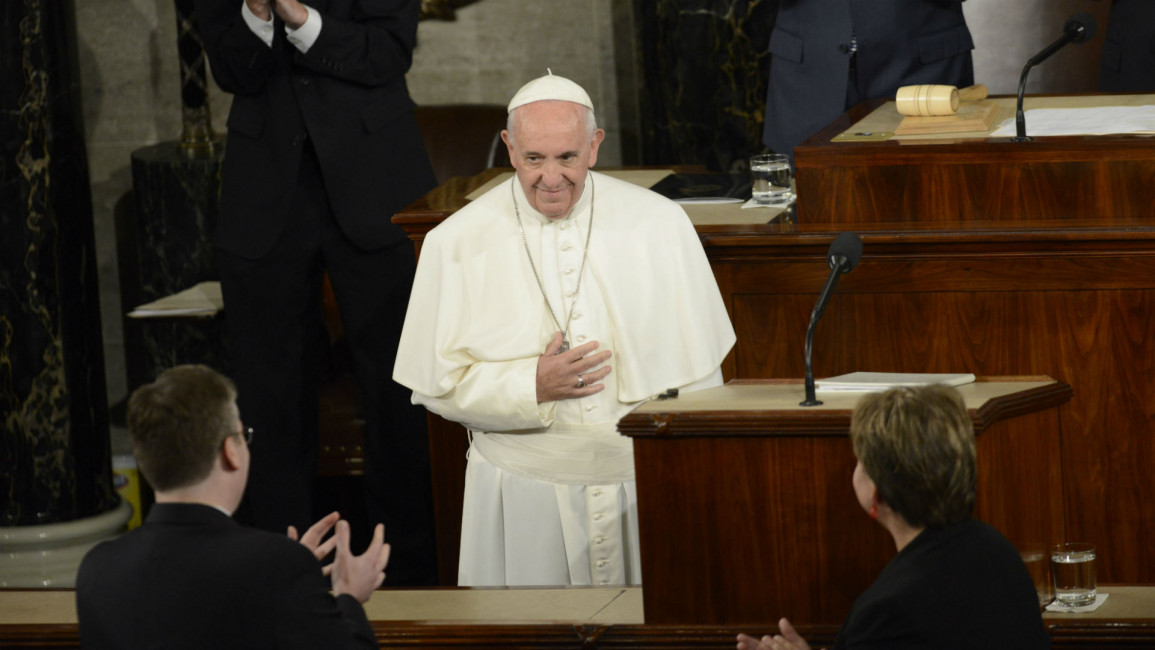Pope takes aim at global economic order at UN
Pope Francis urged a more humane global system that respects the poor and the environment, as he criticised the economic order, in an address to the United Nations on Friday.
The pontiff, whose reform-minded approach has won him a rousing global following even from non-believers, offered his vision of a better world on his latest stop of a US tour that has brought thousands to the streets to welcome him.
Taking the UN rostrum, the leader of the world's more than one billion Catholics called for reform to global bodies, including the UN Security Council and financial lenders, to "limit every kind of abuse and usury."
In a wide-ranging speech, Francis touched on an array of hot-button topics, including the persecution of Christians, the Iran nuclear deal, drug trafficking - "silently killing millions" - and the rights of girls to an education.
"The international financial agencies should care for the sustainable development of countries and should ensure that they are not subjected to oppressive lending systems which, far from promoting progress, subject people to mechanisms which generate greater poverty, exclusion and dependence," Francis said.
| The pope offered a strong endorsement of Iran's agreement to limit its nuclear program. |
Francis, the first Latin American pope, comes from Argentina - where economic crises have fueled criticism of the conditions set by the International Monetary Fund and other institutions.
Francis also gave his latest passionate plea to protect the environment, as he voiced confidence that a high-stakes UN conference on climate change would reach a "fundamental and effective" agreement in Paris in December.
Reaffirming a "right to the environment," the pontiff, 78, said that the universe was "the fruit of a loving decision by the Creator" and that humanity "is not authorised to abuse it, much less to destroy it."
"A selfish and boundless thirst for power and material prosperity leads both to the misuse of available natural resources and to the exclusion of the weak and disadvantaged," he said.
The poor fare worst because they are "forced to live off what is discarded and suffer unjustly from the abuse of the environment," he said.
Silent war
Francis appealed for peace around the world and made his latest plea for the protection of Christians, as well as others, persecuted by extremists in Syria and Iraq.
The pope offered a strong endorsement of Iran's agreement with the United States and five other world powers to limit its nuclear program, a day after Francis spoke to the US Congress, where many lawmakers vehemently oppose the deal.
The Iran agreement "is proof of the potential of political goodwill, exercised with sincerity, patience and constancy," Francis said.
"I express my hope that this agreement will be lasting and efficacious, and bring forth the desired fruits with the cooperation of all the parties involved," he said.
Francis reserved some of his strongest words for drug trafficking, a scourge that has especially affected Latin America.
The pontiff described drug trafficking as a conflict that is "not always so open, yet is silently killing millions of people."
"Drug trafficking is by its very nature accompanied by trafficking in persons, money laundering, the arms trade, child exploitation and other forms of corruption," he said.
Francis warned that trafficking had wide-reaching damage and, "in many cases, has given rise to a parallel structure which threatens the credibility of our institutions."
Man and woman
| Francis has enjoyed a warm response in the United States. |
Francis, who was selected as pope in 2013, has won an unusually avid following even among non-Catholics for his embrace of causes such as climate change and shift away from a rigid focus on social issues.
In one remark that shaped opinions early in his papacy, Francis said of gay priests, "Who am I to judge?"
But at the United Nations, he signaled that the Church was not ready to champion transgender rights, an issue that has drawn growing attention in the United States as gay equality becomes mainstream.
"The defence of the environment and the fight against exclusion demand that we recognise a moral law written into human nature itself, one which includes the natural difference between man and woman and absolute respect for life in all its stages and dimensions," Francis said.
In a possible allusion to same-sex marriage, Francis warned against an "ideological colonisation by the imposition of anomalous models and lifestyles which are alien to people's identity and, in the end, irresponsible."
But he backed the rights of girls, throwing his considerable weight behind a UN goal of a right to education for all children - regardless of gender.
Francis has enjoyed a warm response in the United States, with President Barack Obama welcoming him personally on Wednesday and championing the pontiff's leadership.
Crowds of well-wishers lined the partially closed streets of New York, waving Vatican flags and holding signs to welcome Francis.
The pope later Friday will deliver a mass for tens of thousands at New York's Madison Square Garden.
He will later head to Philadelphia, where he will greet huge crowds at the Festival of Families, a Catholic gathering that takes place every three years



